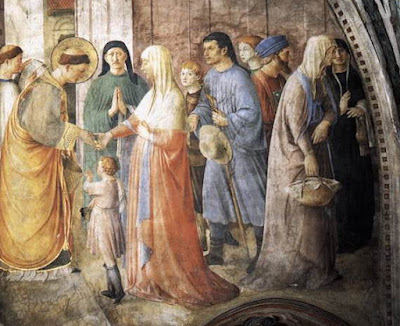There are some scholars who say that these seven were not really “deacons.” Yet, the prayer of ordination of a deacon refers to the naming of seven men by the apostles, as narrated in Acts of the Apostles 6: 1-6.
I remember that day, as the bishop prayed:
en los comienzos de la Iglesia, los apóstoles de tu Hijo, movidos por el Espíritu Santo, eligieron siete hombres de buena fama, como auxiliares suyos en el servicio cotidiano, mediante la oración e imposición de manos, los dedicaron al servicio de los pobres, para poder entregarse ellos, con mayor empeño, a la oración y a la predicación de la palabra.
"in the beginning of the Church, the apostles of your Son, moved by the Holy Spirit, chose seven men with a good reputation, as helpers in the daily service; by means of prayer and the laying on of hands, they dedicated them to the service of the poor, so that they [as apostles] could devote themselves with greater commitment to prayer and the preaching of the Word." (My translation)Though I had read and prayed over the prayer before that day, when I heard the words “los dedicaron al servicio de los pobres,” my body shook. It was as if all that I was trying to do in my life here as a missionary and all that I had tried to live in my life before coming here was being confirmed and indeed “ordered” as a public witness and ministry with the People of God.
The English translation of the prayer of consecration is slightly different: “the apostles entrusted to those chosen men the ministry of serving at tables.” For me, the Spanish version has a fuller meaning: we are called to be at the service of the poor.
The poor are at the center of my diaconal ministry, as they have been at many times of my life before coming here to Honduras, as they have been part of my missionary calling here in Honduras since I arrived in 2007.
I am convinced that being with the poor, at their side, serving them and accompanying them is central to who I am and to what I have been called.
This past year, especially the last few weeks, I have been remiss in this – partly due to emotional pressures and, more recently, a series of colds. But I am convinced that we deacons ought to include this question as we examine our consciences: “When was the last time I was in the house of a poor person?” – more specifically, a physically poor person.
It is good to be an advocate of the poor; it is good to minister to those who are poor emotionally or in terms of their faith. But I am convinced, partly by my experience, partly by the words and witness of Pope Francis, that Jesus calls us to be with those who are impoverished physically and that this is a special call for us deacons.
In his Mass on December 24, Pope Francis noted:
"...let us remember that it is not truly Christmas without the poor. Without the poor, we can celebrate Christmas, but not the birth of Jesus. Dear brothers, dear sisters, at Christmas God is poor: let charity be reborn!"In that homily, Pope Francis cited the sainted archbishop Óscar Romero, who on Christmas 1978 preached these challenging words:
“No one can celebrate an authentic Christmas unless they are truly poor. The self-sufficient, the proud of heart, those who despise others because they do not possess the material goods of this earth, those who do not need or want God --- for these people there is no Christmas. Only the poor, the hungry, and those who need someone to come to them because they have need of someone, someone who is God, someone who is Emmanuel, God-with-us --- only these people are able to celebrate Christmas. Without the spirit of poverty, one is unable to be filled with God.”Toward the end of his homily, Pope Francis said:
"He who lay naked in the manger and hung naked on the cross, asks us for truth, he asks us to go to the bare reality of things, and to lay at the foot of the manger all our excuses, our justifications and our hypocrisies. Tenderly wrapped in swaddling clothes by Mary, he wants us to be clothed in love. God does not want appearances but concreteness. Brothers and sisters, may we not let this Christmas pass without doing something good. Since it is his celebration, his birthday, let us give him the gifts he finds pleasing! At Christmas, God is concrete: in his name let us help a little hope to be born anew in those who feel hopeless!"I believe that we ordained deacons need to show the love of God for the poor concretely, being at their side, listening to them, making their cause our own, suffering with them. This is not easy. It takes us out of our comfort zones. It takes us where we sometimes done want to go. It may even get us into trouble.
But it is where our Lord Jesus, the Servant of Yahweh, is.
“For you know the gracious act of our Lord Jesus Christ, that for your sake he became poor although he was rich, so that by his poverty you might become rich." (2 Corinthians 8:9)
One extra reminder of all this came in the early hours of Christmas. Just back from our Christmas Mass (our midnight Mass that began at 10 pm), I was doing a little computer work when a message arrived from a young man I know from one of our parish villages, with a Christmas greeting. In the course of our messaging back and forth, I found out that he was at the El Paso/Ciudad Juárez border, hoping to cross the bridge and get legally into the US. Jesus among the migrants.







No comments:
Post a Comment